By David Pan · Monday, March 24, 2025 Telos 210 (Spring 2025): Rethinking State Power is now available for purchase in our store. Individual subscriptions to Telos are also available in both print and online formats.
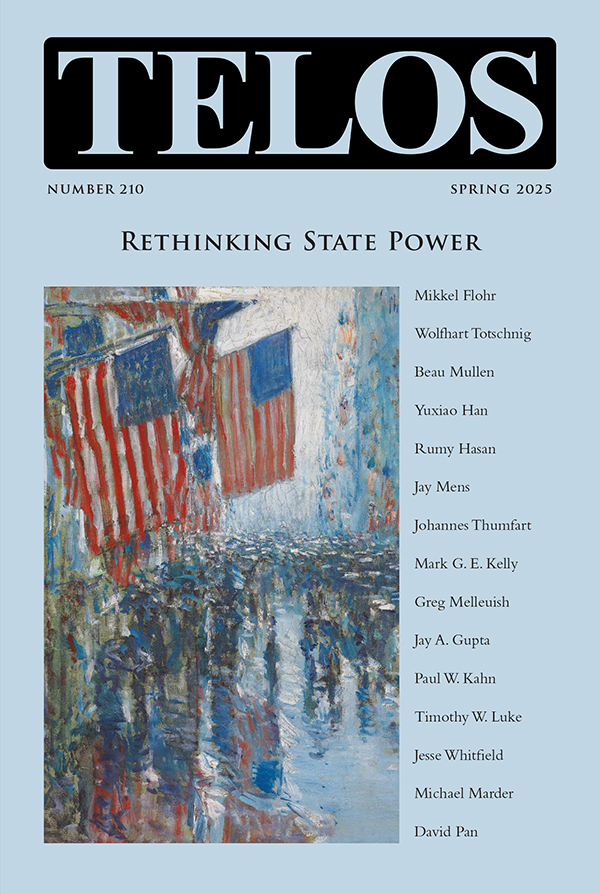 Frustrating the hopes of cosmopolitans and globalists, state power is back. Rather than imagining a replacement of sovereignty with law, political debates now revolve around the particular forms that state sovereignty might take. Even Europe, long seeing itself as the place from which a new international legal order might expand its reach, is reinvesting in military power to protect its sovereignty from the threats posed by Russia, China, and, in some ways, the United States. Yet this realization about the continuing centrality of the state does not mean an abandonment of the moral imperatives and prejudices of the people. On the contrary, state power is being recognized as the instrument through which the people can exercise their will, even as the state places constraints on popular sovereignty. The essays in this issue of Telos consider the ways in which state power interacts with popular attitudes and social institutions in order to establish the basis for sovereignty and law. Frustrating the hopes of cosmopolitans and globalists, state power is back. Rather than imagining a replacement of sovereignty with law, political debates now revolve around the particular forms that state sovereignty might take. Even Europe, long seeing itself as the place from which a new international legal order might expand its reach, is reinvesting in military power to protect its sovereignty from the threats posed by Russia, China, and, in some ways, the United States. Yet this realization about the continuing centrality of the state does not mean an abandonment of the moral imperatives and prejudices of the people. On the contrary, state power is being recognized as the instrument through which the people can exercise their will, even as the state places constraints on popular sovereignty. The essays in this issue of Telos consider the ways in which state power interacts with popular attitudes and social institutions in order to establish the basis for sovereignty and law.
Continue reading →
By David Pan · Monday, January 6, 2025 Telos 209 (Winter 2024): Democracy Today? is now available for purchase in our store. Individual subscriptions to Telos are also available in both print and online formats.
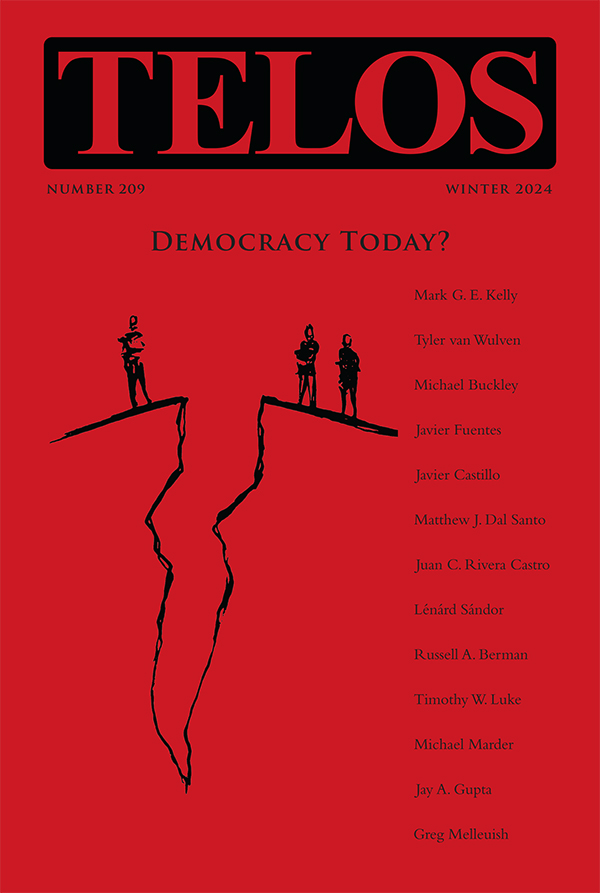 Since the supposed triumph of liberal democracy with the end of the Cold War, democracy seems now to be in retreat. The hung parliaments in France and Germany, reminiscent of the divides of Germany’s Weimar Republic; the just-in-time reversal of the declaration of martial law in South Korea; the increasing authoritarianism of China, Iran, and Russia; and the deterioration of democratic norms in the United States are all indications that the liberal democratic end of history was a chimera. Since the supposed triumph of liberal democracy with the end of the Cold War, democracy seems now to be in retreat. The hung parliaments in France and Germany, reminiscent of the divides of Germany’s Weimar Republic; the just-in-time reversal of the declaration of martial law in South Korea; the increasing authoritarianism of China, Iran, and Russia; and the deterioration of democratic norms in the United States are all indications that the liberal democratic end of history was a chimera.
What is the situation of democracy today? Are the present problems simply growing pains in the inevitable march of history, or are there fundamental limitations of this political form? Is democracy a stable form of government or a delicate balancing act that will always be at risk of deteriorating and being replaced by some form of authoritarianism?
These current indications of the precarity of democracy also coincide, however, with an intense concern for its future. Never has there been such a focus on democracy as a political goal. During the Cold War, the United States, more concerned about promoting capitalism than defending democracy, supported capitalist authoritarianism in places such as Chile, South Korea, and Taiwan. But as it turned out, capitalism did not really need such political backing. In the Cold War between capitalism and communism, the latter lost based on its inability to produce economic growth. Insofar as communism’s undermining of private property and market mechanisms proved to be economically catastrophic, even nominally communist governments in China and Vietnam have since voluntarily embraced capitalist economic policies. Aside from U.S. college campuses, the only diehard Marxists left are in Cuba, North Korea, and Venezuela, all of whose governments are presiding over the immiseration of their peoples.
While it was the Soviet Union, and not capitalism, that collapsed under the weight of its own contradictions, the general recognition of these contradictions meant that communism could only maintain itself by using repressive methods. Communism has been one of the surest ways of moving toward and cementing authoritarianism and totalitarianism. By contrast, capitalist authoritarianism has sometimes led to democratic reforms, and we can point again to Chile, South Korea, and Taiwan, but also to the countries of Eastern Europe, as successful transitioners to democracy within a capitalist framework. Unfortunately, while communism might correlate strongly with authoritarianism, the link between capitalism and democracy does not seem to be so tight.
Continue reading →
By David Pan · Friday, October 18, 2024 Telos 208 (Fall 2024): Carl Schmitt and the Crisis of Liberal Democracy is now available for purchase in our store. Individual subscriptions to Telos are also available in both print and online formats.
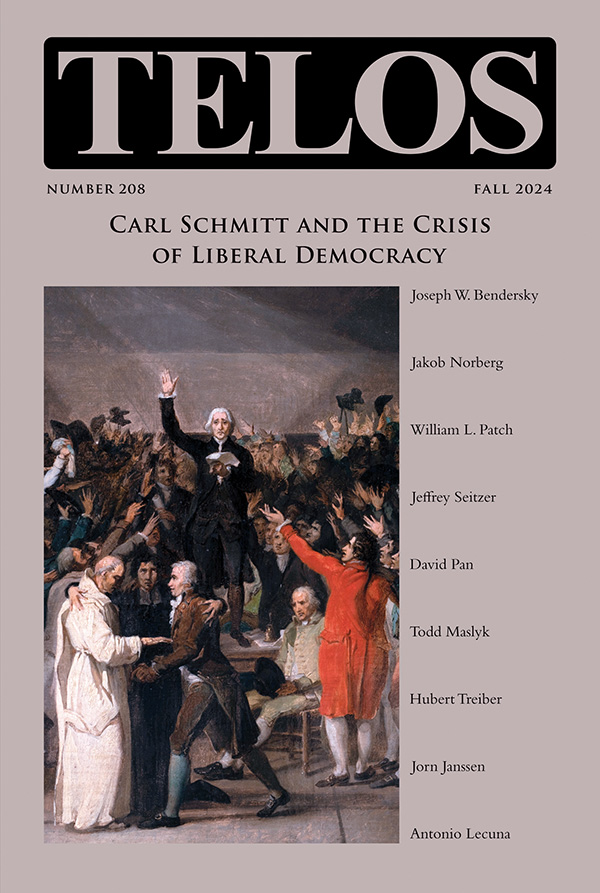 It hardly needs mentioning that liberal democracy is facing a number of threats today, both internal and external. Even if the political parties in the United States cannot agree on the main source of the threats, they both believe that democracy is in danger. Democrats point to the January 6 Capitol riot and Trump’s role in it as examples of the way in which liberal democratic procedures are being directly attacked. Republicans point to the Democratic-backed court cases against Trump as well as the FBI’s favoritism toward Democrats in their public announcements before elections as evidence that the legal system and the administrative state are being used to shut out political opponents. Both parties point to violations of free speech rights at college campuses, yet they also both seek to establish limits to those rights in defense of liberal democratic values. It hardly needs mentioning that liberal democracy is facing a number of threats today, both internal and external. Even if the political parties in the United States cannot agree on the main source of the threats, they both believe that democracy is in danger. Democrats point to the January 6 Capitol riot and Trump’s role in it as examples of the way in which liberal democratic procedures are being directly attacked. Republicans point to the Democratic-backed court cases against Trump as well as the FBI’s favoritism toward Democrats in their public announcements before elections as evidence that the legal system and the administrative state are being used to shut out political opponents. Both parties point to violations of free speech rights at college campuses, yet they also both seek to establish limits to those rights in defense of liberal democratic values.
Meanwhile, authoritarian governments in places such as China, Russia, Iran, and North Korea have becoming increasingly aggressive in opposing liberal democracies as threats to their own legitimacy. In doing so, they have attempted to provide theoretical justifications for their authoritarian rule that are based in anti-Western and anti-colonial discourses that align with critiques of the West advanced by left-leaning academics in liberal democracies.
Because they are based on freedom of expression and freedom of conscience, liberal democracies must allow open public spheres whose dynamics could take unforeseen directions that end up undermining the cultural and procedural foundations of liberal democratic governance. While the American Revolution provides the best example of the success of liberal democracy, the French Revolution and the Weimar Republic demonstrate spectacular failures. Outside of the West, the contrast between Taiwan and China and between Indonesian democracy and the Iranian Revolution indicate that we can find the same contrasts between failure and success in East Asia and in the Islamic world.
Continue reading →
By David Pan · Friday, January 12, 2024 Telos 205 (Winter 2023): Forms of War is now available for purchase in our store. Individual subscriptions to Telos are also available in both print and online formats.
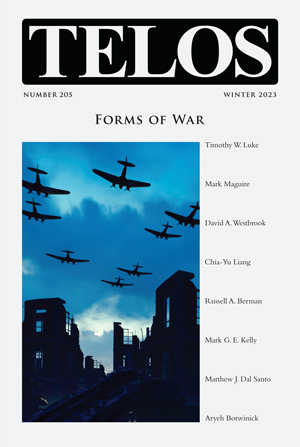 One of the most challenging aspects of the wars in Ukraine and Israel is the way in which the conflicts have been constantly shifting in form. In the first place, there is a conventional ground war between Russia and Ukraine, in which the identity and will of the two peoples are at stake. Yet Russia has used weapons supplied by Iran and North Korea, and Ukraine relies on NATO for its own supplies, indicating that this war depends on the maintenance and expansion of alliances. The stability of these alliances in turn depends on a combination of Realpolitik and shared values as the glue that holds them together. This logic of alliances motivates the energy war that Russia is waging with Europe, revealing that, unbeknownst to Europe, Russian energy policy over the last decade was an early form of the war. Similarly, the threat of nuclear war also tests the resolve of NATO, forcing it to consider the values at stake in the conflict. Is the war about Ukraine’s sovereignty or the principle of nation-state sovereignty itself? Is it about human rights for Ukrainians or the entire human rights project? For Russia, is it about self-defense or a pan-Slavic identity? Is it about the protection of Russian minorities in Ukraine or the threat of Western secularization? The answers to these questions will determine the will to fight on each side and thus the length and ferocity of the war. One of the most challenging aspects of the wars in Ukraine and Israel is the way in which the conflicts have been constantly shifting in form. In the first place, there is a conventional ground war between Russia and Ukraine, in which the identity and will of the two peoples are at stake. Yet Russia has used weapons supplied by Iran and North Korea, and Ukraine relies on NATO for its own supplies, indicating that this war depends on the maintenance and expansion of alliances. The stability of these alliances in turn depends on a combination of Realpolitik and shared values as the glue that holds them together. This logic of alliances motivates the energy war that Russia is waging with Europe, revealing that, unbeknownst to Europe, Russian energy policy over the last decade was an early form of the war. Similarly, the threat of nuclear war also tests the resolve of NATO, forcing it to consider the values at stake in the conflict. Is the war about Ukraine’s sovereignty or the principle of nation-state sovereignty itself? Is it about human rights for Ukrainians or the entire human rights project? For Russia, is it about self-defense or a pan-Slavic identity? Is it about the protection of Russian minorities in Ukraine or the threat of Western secularization? The answers to these questions will determine the will to fight on each side and thus the length and ferocity of the war.
Similarly, the war between Israel and Hamas began with Hamas’s use of terror and rape as instruments of war. The idea was to provoke Israel into attacking Hamas and causing civilian casualties. Because the terrain of war extends to public opinion in the West, Hamas’s use of Israeli hostages and Palestinian human shields becomes part of its strategy of increasing civilian casualties in the war. Even though Hamas is the ultimate cause of such casualties, Hamas is able to pressure Israel by placing civilians in the path of Israel’s war effort. The conflict on the ground in Gaza is thus overshadowed by the struggle for hearts and minds across the globe.
Continue reading →
By David Pan · Wednesday, July 26, 2023 Telos 203 (Summer 2023): The Manifold Foundations of Human Rights is now available for purchase in our store. Individual subscriptions to Telos are also available in both print and online formats.
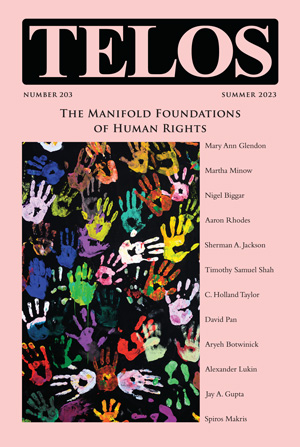 One of the most disappointing human rights debacles in the last few years was the withdrawal of U.S. forces from Afghanistan. For those who still take an interest, the human rights situation there has become horrendous, with Human Rights Watch documenting the denial of schooling and employment to women, extrajudicial killings, and torture. Moreover, in a severe rebuttal to those who supported the withdrawal, Taliban rule has created the conditions for a renewal of terrorist groups that can now develop and train in Afghanistan with impunity. There is also a good case to be made that the U.S. withdrawal there emboldened Putin to invade Ukraine, calculating that the United States and its allies no longer have the stomach for protracted conflicts in order to prevent human rights abuses. It may be that we have traded a low-grade conflict in Afghanistan for a high-intensity one in Ukraine. The lesson here is that the struggle for human rights, while beginning as a moral problem about our common responsibilities, can only be taken seriously when we consider its political ramifications. What do we owe to our fellow humans, and what sacrifices should we make in order to fulfill those responsibilities? One of the most disappointing human rights debacles in the last few years was the withdrawal of U.S. forces from Afghanistan. For those who still take an interest, the human rights situation there has become horrendous, with Human Rights Watch documenting the denial of schooling and employment to women, extrajudicial killings, and torture. Moreover, in a severe rebuttal to those who supported the withdrawal, Taliban rule has created the conditions for a renewal of terrorist groups that can now develop and train in Afghanistan with impunity. There is also a good case to be made that the U.S. withdrawal there emboldened Putin to invade Ukraine, calculating that the United States and its allies no longer have the stomach for protracted conflicts in order to prevent human rights abuses. It may be that we have traded a low-grade conflict in Afghanistan for a high-intensity one in Ukraine. The lesson here is that the struggle for human rights, while beginning as a moral problem about our common responsibilities, can only be taken seriously when we consider its political ramifications. What do we owe to our fellow humans, and what sacrifices should we make in order to fulfill those responsibilities?
Continue reading →
By Telos Press · Tuesday, April 25, 2023 In today’s episode of the Telos Press Podcast, David Pan talks with John Milbank about his article “A Tale of Two Monsters and Four Elements: Variations of Carl Schmitt and the Current Global Crisis,” from Telos 201 (Winter 2022). An excerpt of the article appears here. In their conversation they discuss the three idioms into which Milbank divides Carl Schmitt’s thought; why they should be seen as separate idioms rather than different aspects of a single perspective; the extent of overlap between the idioms; whether the decisionist Schmitt is as arbitrary as he is made out to be; the characteristics of a medieval European conception of nomos that Schmitt wishes to retrieve; the similarities between Schmitt’s third idiom of global regions and both Nazism and Russian theorists like Gumilev, Panarin, and Dugin; Schmitt’s decisionism, basic values, identity, and thinking through popular sovereignty. If your university has an online subscription to Telos, you can read the full article at the Telos Online website. For non-subscribers, learn how your university can begin a subscription to Telos at our library recommendation page. Print copies of Telos 201 are available for purchase in our online store.
Continue reading →
|
|
 Frustrating the hopes of cosmopolitans and globalists, state power is back. Rather than imagining a replacement of sovereignty with law, political debates now revolve around the particular forms that state sovereignty might take. Even Europe, long seeing itself as the place from which a new international legal order might expand its reach, is reinvesting in military power to protect its sovereignty from the threats posed by Russia, China, and, in some ways, the United States. Yet this realization about the continuing centrality of the state does not mean an abandonment of the moral imperatives and prejudices of the people. On the contrary, state power is being recognized as the instrument through which the people can exercise their will, even as the state places constraints on popular sovereignty. The essays in this issue of Telos consider the ways in which state power interacts with popular attitudes and social institutions in order to establish the basis for sovereignty and law.
Frustrating the hopes of cosmopolitans and globalists, state power is back. Rather than imagining a replacement of sovereignty with law, political debates now revolve around the particular forms that state sovereignty might take. Even Europe, long seeing itself as the place from which a new international legal order might expand its reach, is reinvesting in military power to protect its sovereignty from the threats posed by Russia, China, and, in some ways, the United States. Yet this realization about the continuing centrality of the state does not mean an abandonment of the moral imperatives and prejudices of the people. On the contrary, state power is being recognized as the instrument through which the people can exercise their will, even as the state places constraints on popular sovereignty. The essays in this issue of Telos consider the ways in which state power interacts with popular attitudes and social institutions in order to establish the basis for sovereignty and law. 





